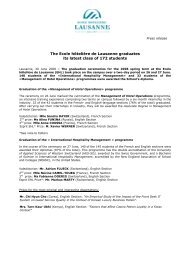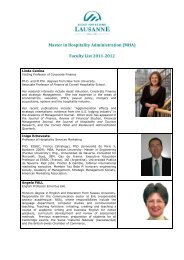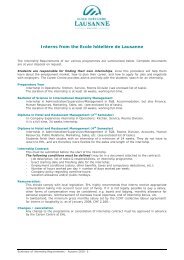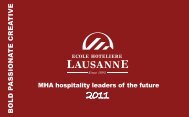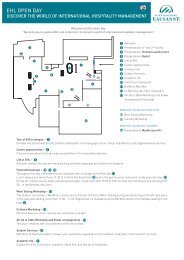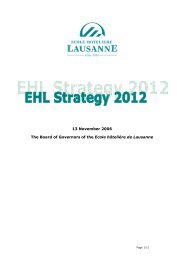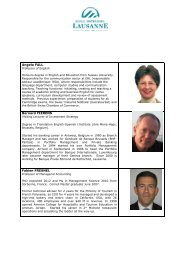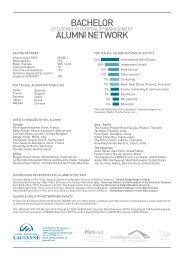EHL Course Catalogue 2011-2012 - Ecole Hôtelière de Lausanne
EHL Course Catalogue 2011-2012 - Ecole Hôtelière de Lausanne
EHL Course Catalogue 2011-2012 - Ecole Hôtelière de Lausanne
Create successful ePaper yourself
Turn your PDF publications into a flip-book with our unique Google optimized e-Paper software.
impact of tourism on a local, regional or national economy through analysing tourism satellite<br />
accounting data.<br />
8123BR – Business law<br />
40 hours of contact – 4 US quarter credits - 4 ECTS credits<br />
� Summary<br />
The stu<strong>de</strong>nts will acquire legal awareness to major business law issues encountered in the<br />
international hospitality sector. They will discover the different phases of the life of a hospitality<br />
enterprise (from its creation to its eventual liquidation). They will experience the major functions<br />
within such an enterprise (administrators, sharehol<strong>de</strong>rs, CEO, directors of HR, Finance,<br />
Operations or Core Business and Marketing) and the sectors of business law these managers will<br />
be confronted with in the course of their duties . They will learn where to seek expert advice or<br />
how to choose and manage outsi<strong>de</strong> counsel.<br />
� Objective<br />
On completion of the unit, you should be able to: Subject specific competences. Recognize<br />
corporate structures in various international business contexts, in particular in the hospitality<br />
sector (SSC1)<br />
I<strong>de</strong>ntify the key elements of contracts in the hospitality sector (SSC2). Evaluate corporate<br />
exposure to risks and available courses of action (SSC3). Choose appropriate courses of action<br />
and substantiate your position (SSC4).<br />
8124BC – Managerial accounting<br />
40 hours of contact – 4 US quarter credits - 4 ECTS credits<br />
� Summary<br />
The aim of this course is to <strong>de</strong>velop stu<strong>de</strong>nts‟ ability to build, execute, and control a budget, which is<br />
one of the most important business skills. Financial statements will be used to evaluate a company‟s<br />
performance, i<strong>de</strong>ntify cost drivers and potential opportunity for performance improvements, and<br />
estimate contribution margin ratios. From these parameters and justified assumptions, a budget<br />
consisting of the income statement, the balance sheet, the statement of cash flows, and the cash<br />
budget will be <strong>de</strong>veloped. Through the budget <strong>de</strong>velopment process, tra<strong>de</strong>-off <strong>de</strong>cisions between<br />
<strong>de</strong>partments and i<strong>de</strong>ntifications of the impacts of business <strong>de</strong>cisions on the financial statements will<br />
be executed. Finally, based on feedback provi<strong>de</strong>d by the operation results, corrective suggestions will<br />
be ma<strong>de</strong>.<br />
<strong>Ecole</strong> <strong>Hôtelière</strong> <strong>de</strong> <strong>Lausanne</strong> – <strong>Course</strong> <strong>Catalogue</strong> Page | 22




